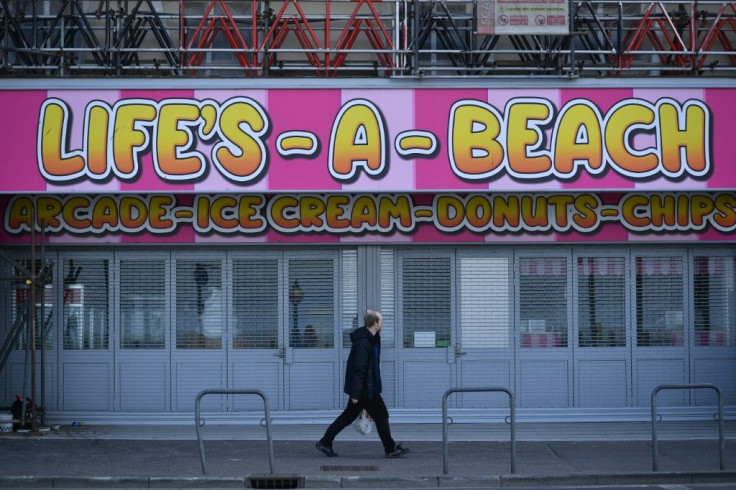Coronavirus Economy: Britain’s GDP Tanked By 20% In April As Lockdown Paralyzed Almost All Sectors

KEY POINTS
- U.K.’s key services sector contracted by almost 20% in April
- Air transport sector plummeted by 92.8% -- the largest decline of any sector
- Construction output dropped by 40%.
The British economy shrank by an extraordinary 20.4% in April –the biggest monthly drop in recorded history -- due to effects of the covid-19 related lockdown.
The decline was three times larger than the economic contraction witnessed during the darkest days of the Great Recession – from the peak in February 2008 to the lowest point of March 2009.
The government’s Office for National Statistics, or ONS, said this "historic" drop in April 2020 impacted virtually all areas of business activity in the country.
ONS said U.K.’s key services sector contracted by almost 20% as thousands of non-essential shops. pubs, restaurants and hotels were closed to prevent the spread of the virus.
The air transport sector plummeted by 92.8% -- the largest decline of any sector -- as air travel was virtually halted. The accommodation and food services sector did almost as badly – shrinking by 88%. Construction output dropped by 40%.
Over the three-month period through the end of April, U.K. gross domestic product fell by 10.4%
"[The April fall was] more than three times larger than last month [March] and almost 10 times larger than the steepest pre-Covid-19 fall," said Jonathan Athow, the deputy national statistician for economic statistics at ONS. "In April, the economy was around 25% smaller than in February. Virtually all areas of the economy were hit, with pubs, education, health and car sales all giving the biggest contributions to this historic fall."
However, as the lockdown was gradually eased in May, analysts expect April to represent the bottom of this economic trajectory.
"It's highly likely April will be the low point,” Athow told BBC. "Our own surveys and wider indicators have suggested a pick-up in economy activity, but I think it's really too early to know how quickly economic activity will recover in the coming months."
Andrew Wishart, U.K. economist at Capital Economics cautioned: "Given [that] the lockdown started to be eased in May, April will mark the trough in GDP. So we are past the worst. But the recovery will be a drawn-out affair, as restrictions are only lifted gradually and businesses and consumers continue to exercise caution."
As of now, nearly 9 million British workers are receiving wage subsidies from the government. Under this furlough scheme, workers receive 80% of their monthly salary up to £2,500 ($3,148). Thus far, this scheme has cost some £19.6 billion ($24.7 billion).
Meanwhile the number of people claiming unemployment benefits surged by 856,500 to 2.1 million in April.
“[First quarter] GDP figures highlighted the damage caused by just the first few weeks of lockdown -- the [second quarter] estimates expected later this month will show output in a crater,” said Ed Monk, associate director for Personal Investing at Fidelity International. “However, with social distancing measures starting to relax, businesses slowly returning to work, and moves to reopen non-essential shops from Monday, the economy is gradually reopening and the growth number will hopefully spring back in the months ahead. The question is by how much, and the ability of companies to stay afloat and retain staff is now key.”
Chancellor of the Exchequer Rishi Sunak sounded somewhat more optimistic.
"In line with many other economies around the world, coronavirus is having a severe impact on our economy,” he said. “The lifelines we've provided with our furlough scheme, grants, loans and tax cuts have protected thousands of businesses and millions of jobs -- giving us the best chance of recovering quickly as the economy reopens. Next week, more shops on the high street will be able to open again as we start to get our lives a little bit more back to normal.”
But Tej Parikh, chief economist at the Institute of Directors, said the government needs to do more to safeguard peoples’ livelihoods, as the "unparalleled" economic turmoil was "likely to scar the U.K. economy for some time yet.”
"Having provided businesses life support, the government must now figure out how to stimulate activity," he said. "Waiting until later in the year to act will risk more businesses and jobs will be lost."
Suren Thiru, head of economics at the British Chambers of Commerce, was also cautious about a recovery.
“Some firms, including those in our hospitality, leisure and tourism industries, may remain closed for some time and will require flexible and open-ended government support to weather the economic storm,” he said
The Organization for Economic Co-operation and Development warned earlier this week that the U.K. economy will contract by 11.5% in 2020 – among the worst of the developed nations – if a second virus wave does not emerge.
The Bank of England forecast that GDP could shrink by 25% in the second quarter and unemployment will more than double.
Howard Archer, the chief economic advisor to the EY ITEM Club, expects British GDP to fall by more than 13% in the second quarter.
“Assuming the government continues to gradually relax the lockdown restrictions, the economy is expected to start to return to clear growth in the third quarter,” he said. “Pent-up consumer demand following the lockdown should help, while global economic activity should also be stronger from the latter months of 2020 onwards. There will be challenges, with unemployment likely to rise significantly in the coming months.”
© Copyright IBTimes 2025. All rights reserved.





















